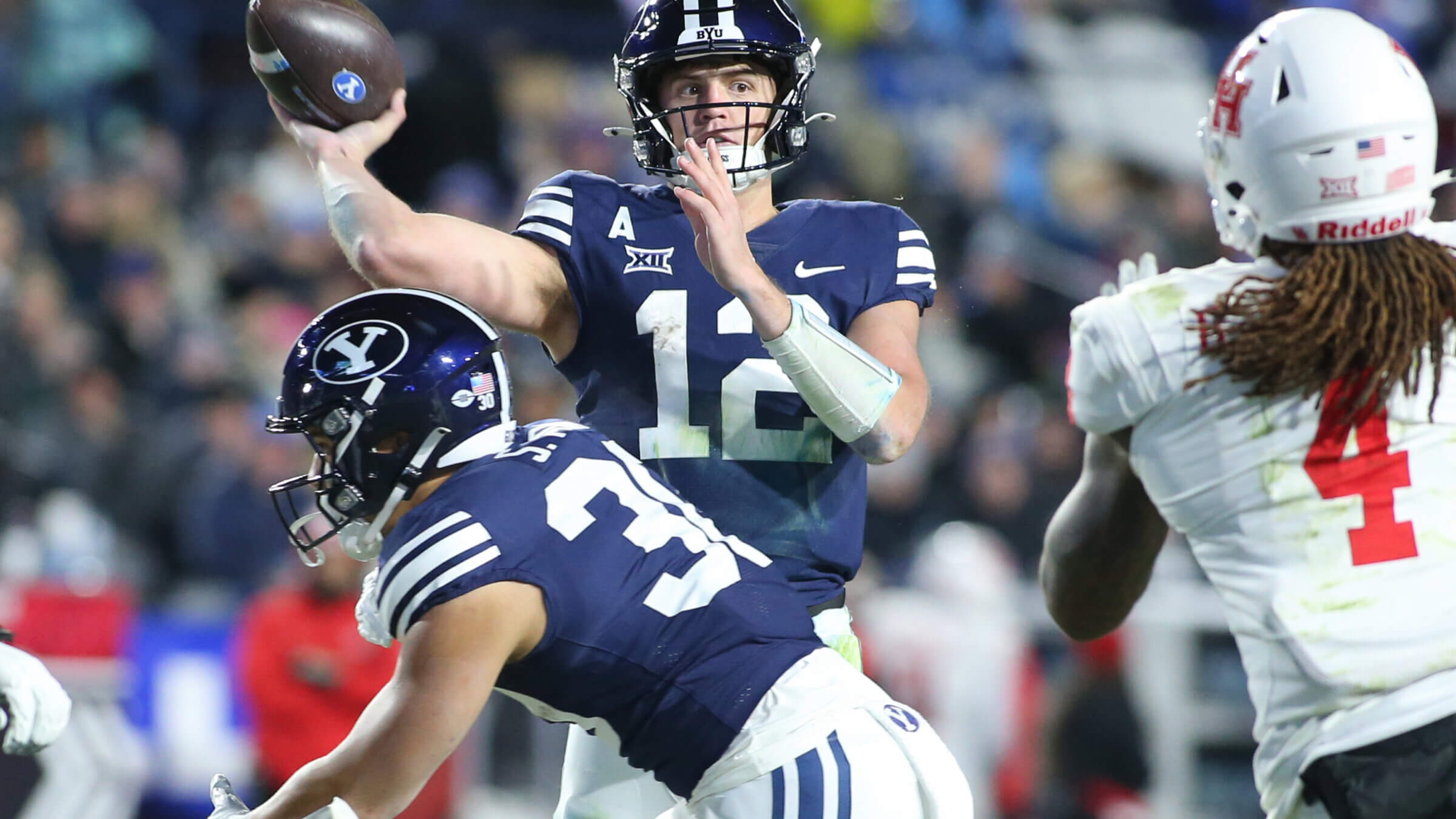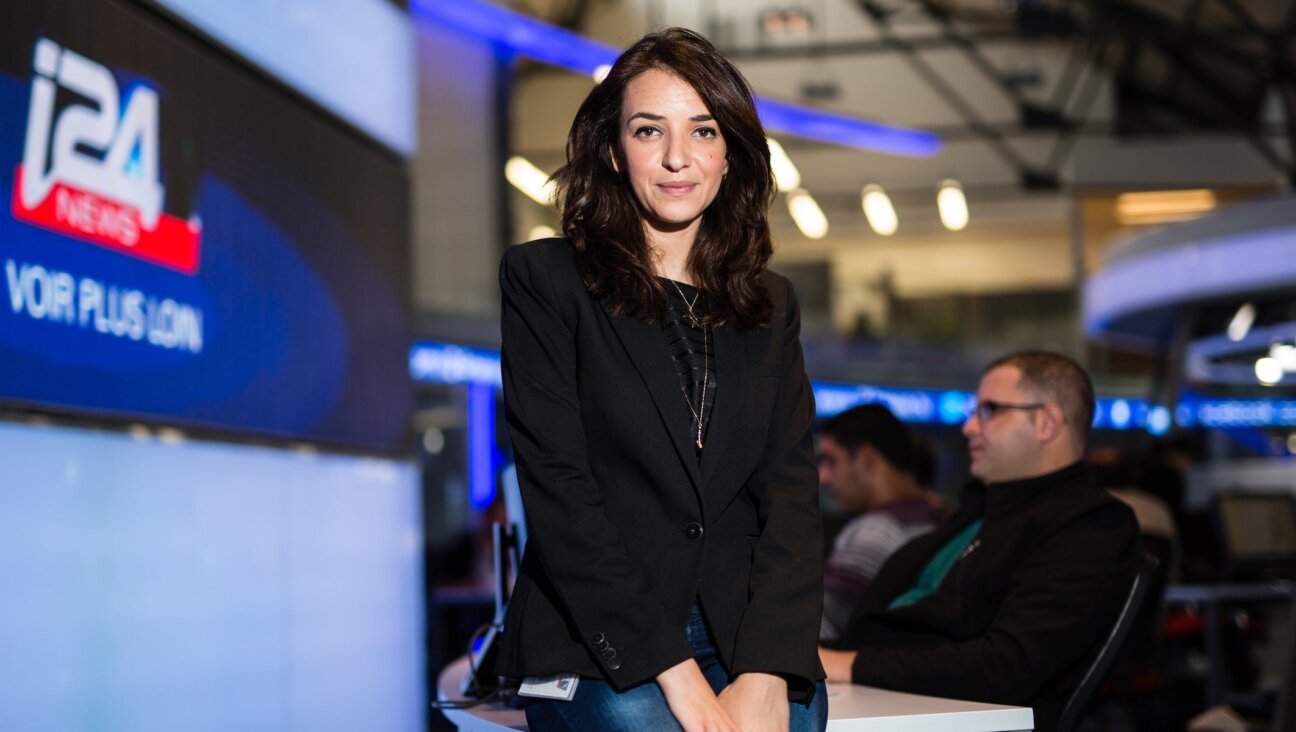Pass the matzo: Brigham Young’s Jewish quarterback lands endorsement deal with Manischewitz
The purveyor of gefilte fish and macaroons partners with Jake Retzlaff for a series of videos that will release between now and Passover

Jake Retzlaff has led Brigham Young to a 10-2 record in his first year as a starter. Photo by Chris Gardner/Getty Images
Since the NCAA began allowing college athletes to get paid for endorsements in 2021, the most delightful deals have tended to draw upon a natural association between player and company. Hoopers with the surnames Roach and Buggs became brand ambassadors for Raid insecticide; a wide receiver named Decoldest Crawford did an air-conditioning commercial.
And now, the only Jewish starting quarterback in Division I has a deal with Manischewitz.
Jake Retzlaff of Brigham Young University — yes, that’s the school affiliated with the Church of Jesus Christ of Latter-day Saints — will represent the matzo maker under a name, image, and likeness (NIL) contract that runs through the end of the school year. Manischewitz would not reveal the financial terms of the sponsorship.
The company plans to put out a series of videos featuring Retzlaff between now and the end of Passover. In the first, posted online Wednesday, Retzlaff is seated at a mock news conference and autographs a piece of matzo while Jewish music plays in the background.
“I’m Jake Retzlaff, first Jewish quarterback at Brigham Young University, known as the B-Y-Jew,” he says in the clip. “A lot of people have been asking what’s my next big move. I’m excited to announce that I’ll be joining Team Manischewitz.”
Smiling, he unzips his hoodie to reveal an orange Manischewitz jersey, then dons a Manischewitz cap and poses with a variety of the company’s signature products.
BYU’s Jake Retzlaff, the only Jewish starting quarterback in D-I, got an NIL deal from Manischewitz. pic.twitter.com/TvVb6NCxPH
— Louis Keene (@thislouis) December 5, 2024
Retzlaff, who became a bar mitzvah at a Reform synagogue in Pomona, California, says he chose BYU for its pass-first offense. But he has leaned into his Jewish background since arriving on campus, where he is believed to be one of three Jews among its 35,000 students. He wears a Star of David pendant, wrapped tefillin with the local Chabad rabbi and participated in a public candle lighting ceremony last Hanukkah.
In a news release about the sponsorship, Retzlaff said the pantry in his house growing up was stocked with Manischewitz products.“I grew up with matzo with peanut butter as my favorite snack, and every Passover, my family and I made matzo pizza together,” he said. “At Hannukah time, our tradition was making potato latkes. Now, at BYU, I’m able to share these traditions with my teammates. This partnership is about more than football — it’s about creating connections and celebrating Jewish pride in ways I never expected.”
Shani Seidman, Manischewitz’s chief marketing officer, said Retzlaff’s Jewish pride made her eager to pursue the partnership. So did his team’s success.
BYU won its first nine games this season; now 10-2, the team is ranked 18th in the nation. Retzlaff, a junior, has thrown for 2,796 yards and 20 touchdowns in his first season as a starter, with 10 interceptions.
“It’s a feel-good story,” Seidman said in an interview. “It felt very Americana, the same way that Manischewitz as a brand kind of has that Americana legacy.”
The NIL deal is the latest step into the future for Manischewitz, a Jewish legacy brand founded in 1888. Earlier this year, the company redesigned its packaging and changed some of its recipes.
But it is not the company’s first celebrity endorsement: Sammy Davis Jr. appeared in a commercial for Manischewitz wine in the 1970s.
Speaking of which, the violet elixir you love to hate won’t appear in any of the Retzlaff videos. That’s because Manischewitz doesn’t actually make or distribute it anymore — the company sold its wine division in the 1980s.
Promoting the sweet wine would likely have posed problems anyway: BYU’s honor code, informed by the strictures of the church, bans the consumption of alcohol.
















